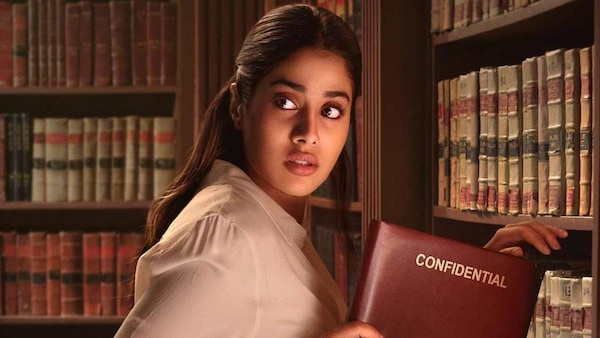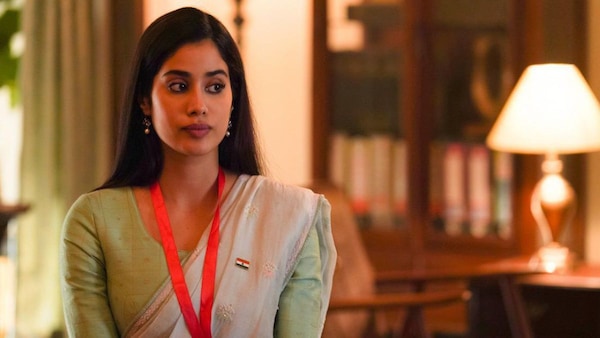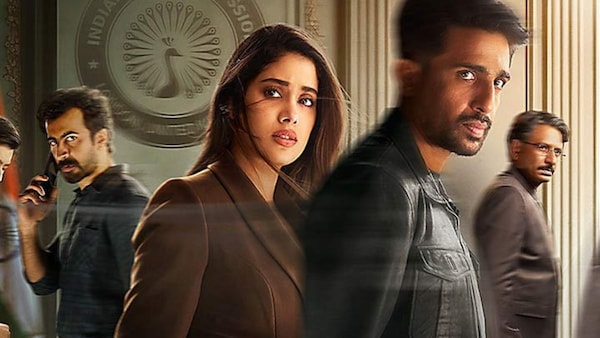Janhvi Kapoor's Ulajh Gets Caught In Its Own Web
Directed by Sudhanshu Saria, Ulajh conjures very little tension to sustain interest. It does not help that apart from wasting its potential, the film also squanders the terrific actors it assembled.

Janhvi Kapoor in Ulajh. YouTube screengrab
Last Updated: 04.19 PM, Aug 02, 2024
JANHVI KAPOOR's career can be read as a metaphor. Born to famous parents (her mother, Sridevi was a superstar and her father Boney Kapoor is a producer), she is, what is disparagingly called, a 'nepo-baby' prone to getting easy opportunities. The outline of her filmography evinces this. She made her debut with Karan Johar’s Dharma Productions, an unfeasible move for most newcomers, and since then has headlined six films even though none of them was commercially clutter-breaking. These, however, haven’t been heedless but strategic choices. In most of her outings, she is the sole lead and shoulders responsibility that not many young female actors do or are allowed to. It is like Kapoor has been building her own alternate narrative within the one handed down to her: an insider trying hard to earn the privilege she inherited. Ulajh, her latest film, is crafted around this parallel.
On paper, it is a smart decision, more so for the way it is positioned. Ulajh, written by Parveez Shaikh and Sudhanshu Saria; Saria is also the director) centres on a young Indian Foreign Service (IFS) officer, Suhana Bhatia (Kapoor) born to a family of bureaucrats. Suhana is a nepo-baby (the choice of name is cheeky) and all she wants to do is make her diplomat father proud. The chance arrives early. Suhana becomes deputy high commissioner in the United Kingdom, a coveted position that makes everyone happy except her father who feels she is too young. Soon comes the line that intensifies the narrative Kapoor’s career has been adding up to: “No matter how I got the position, I will do my best to fulfil it”, Suhana tells her father.
At its heart, Ulajh traces the journey of an insider as she faces accusations of favouritism (in one scene, an outsider openly says, “What does she have except her surname?) and is blackmailed to choose between her country and her legacy. If we break it down and put it in the context of the Hindi film industry, Ulajh poses a familiar question: what will an insider do when forced to pick between preserving their surname or selling out? It says, first they will sell out.

This pluckiness of such a suggestion is impressive. So are the little things it does. Like, the easy mistake Suhana commits, one that plunges her into the web of extortion, which reiterates her unreadiness for such a position and her sheltered upbringing (although Gulshan Devaiah’s kooky accent is a red flag by a mile); or that we never see Suhana doing actual work but people praising her all the same. The design is telling, a direct commentary on the elevated way people view insiders and how little the latter have to work to earn praise. On the other hand, other RAW agents like Jacob Tamang (Meiyang Chang) and Sebin Joseph Kutty (Roshan Mathew) are overlooked and become easy suspects for something Suhana is guilty of. Ulajh also ties this up with the issue of national security, drawing an analogy, rather oblique, that insiders (Indians and/or Hindus) almost always evade suspicion while it is the outsiders who are susceptible to blame.
Even though the politics work, the filmmaking in Ulajh is a constant problem that belittles the potential. Take for instance, how little the film tries to design Suhana as a flesh and blood person. Although she occupies the front and the centre of the story, she is lent no sense of interiority and little spark. There is something to be said about Kapoor’s one-note performance, till things improve later, but Ulajh limits her to a young, vulnerable girl who goes through the motions with no resistance. When faced with a crisis, she decides to give in and when she gets overwhelmed, she stands on the top of her building, contemplating suicide. In a ridiculous instance, she gets a call right at that moment from her father who tells her, “Don’t give up”.

There is also the issue of how loose the screenplay is. Ulajh draws an easy comparison with Meghna Gulzar’s Raazi (2018), both helmed by female actors who undergo moral crises to prove their patriotism. But Saria’s film conjures very little tension to sustain interest. The film especially feels convenient with Suhana accessing vital information with reckless ease. Characters flit in and out of the frame as if to ensure that she gets what she needs. It does not help that apart from wasting its potential, Ulajh also squanders the terrific actors it assembled. Some of the casting gives way to bigger twists (one knows Rajesh Tailang would not just be Suhana’s chauffeur) but even others, primarily Mathew and Jaimini Pathak, have scarce to do.
One must pause here to take stock of Devaiah’s turn which is excessive and, frankly, ridiculous. The actor plays his character like R. Madhavan did in Shaitaan (2024) which is to say he is constantly self-aware and attuned to the fact that he is supposed to be something and not someone. Otherwise reliable, Devaiah hams it up and robs much of the earnestness of the film.
Ulajh closes with a sobering thought, that both the insider and the outsider are needed to get the job done. One can place it in any context they want but by giving neither much to do, the film undoes its messaging. What good is the coming together of both if the film, or the country, fails them? What good is a metaphor if the text is so weak?
